-
Record December boosted 2015 to second warmest year for contiguous U.S.

The 2015 annual average U.S. temperature was 54.4°F, 2.4°F above the twentieth century average, the second warmest year on record. Only 2012 was warmer for the United States with an average temperature of 55.3°F. This is the nineteenth consecutive year the annual average temperature exceeded the twentieth century average. The first part of the year was marked by extreme warmth in the West and cold in the East, but by the end of 2015, record warmth spanned the East with near-average temperatures across the West. This temperature pattern resulted in every state having an above-average annual temperature.
-
-
The Anthropocene: Hard evidence for a new, human-driven geological epoch
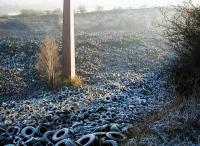
The evidence for a new geological epoch which marks the impact of human activity on the Earth is now overwhelming, according to a recent paper by an international group of geoscientists. The Anthropocene, which is argued to start in the mid-twentieth century, is marked by the spread of materials such as aluminum, concrete, plastic, fly ash, and fallout from nuclear testing across the planet, coincident with elevated greenhouse gas emissions and unprecedented trans-global species invasions. The researchers set out to anser this question: To what extent are human actions recorded as measurable signals in geological strata, and is the Anthropocene world markedly different from the stable Holocene Epoch of the last 11,700 years which allowed human civilization to develop?
-
-
Professor fired for saying Muslims and Christians worship same God

Dr. Larycia Hawkins, a teacher of political science at Wheaton College in Illinois who has lost her job after claiming that Muslims and Christians worshipped the same God, has responded to her dismissal, saying she was “flummoxed and flabbergasted” by the decision to fire her. The college initiated termination proceedings, saying Hawkins had refused to take part in “clarifying conversations” about the theological issues raised by her comments.
-
-
Drought, heat deleterious for global crops

Drought and extreme heat slashed global cereal harvests between 1964 and 2007 — and the impact of these weather disasters was greatest in North America, Europe, and Australasia. At a time when global warming is projected to produce more extreme weather, a new study provides the most comprehensive look yet at the influence of such events on crop area, yields, and production around the world.
-
-
Current pace of environmental change unprecedented in Earth’s history
Researchers have further documented the unprecedented rate of environmental change occurring today, compared to that which occurred during natural events in Earth’s history. The environmental change in the past “appears to have been far slower than that of today, taking place over hundreds of thousands of years, rather than the centuries over which human activity is increasing atmospheric carbon dioxide levels,” says a leading expert.
-
-
Remote-controlled robot inspects suitcase bombs
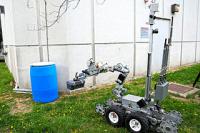
Abandoned items of luggage are frequently found at airports and train stations. This is a case for the emergency services, which have to assume that these items might contain bombs. They must assess the potential threat quickly, avert any possible danger, and preserve evidence for criminal proceedings. In the future, police will have the support of a remote-controlled sensor system as they go about their duties. Researchers are developing this sensor suite in cooperation with industry partners and criminal investigation authorities.
-
-
Global electricity production vulnerable to climate change, water resource decline

Climate change impacts and associated changes in water resources could lead to reductions in electricity production capacity for more than 60 percent of the power plants worldwide from 2040-2069. A new study calls for a greater focus on adaptation efforts in order to maintain future energy security. Making power plants more efficient and flexible could mitigate much of the decline.
-
-
Large and growing methane emissions from northern lakes

Methane is increasing in the atmosphere, but many of its sources are poorly understood. Climate-sensitive regions in the north are home to most of the world’s lakes. New research shows that these northern freshwaters are critical emitters of methane, a more effective greenhouse gas than carbon dioxide.
-
-
Making cleaner fuel cells

There is a near unanimity in the scientific community that the average temperature on the planet is rising and this is happening because of the increased concentration of carbon dioxide in the atmosphere. Radically redesigning virtually all technological infrastructure is not possible without an acceptable alternative to internal combustion engines: either electric accumulators and electric motors, or fuel cells with electric motors. Fuel cells themselves will not solve the problem of rising temperatures on the planet, but they are part of a possible solution. Researchers have developed ion-exchange synthetic membranes based on amphiphilic compounds that are able to convert the energy of chemical reactions into electrical current.
-
-
Snake robot range-sensing control system improves search-and-rescue performance

Rescue operations at disaster scenes often use robots to avoid further human danger. Modelling robots on snakes can provide better access through narrow paths in rubble, but previous models which control snake robots by the head do not adequately avoid collisions between the body of the robot and surrounding obstacles. Researchers say that to be more effective in search and rescue missions, robotic snakes should comprise a series of sections joined by links which either pitch up and down or yaw through sideways turning angles.
-
-
Developing materials for more resilient concrete pavements
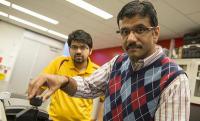
Aging roadways pose a growing threat to transportation infrastructure which is critical to the health of economies throughout the world. Beyond the daunting task of funding extensive restoration efforts, there is an equally pressing challenge to find ways to rebuild major roads which are more sustainable. Researchers have been experimenting with what are called phase-change materials to produce more resilient concrete surfaces for roads and bridges. Phase-change materials are substances which respond to temperature variations by changing their state from solid to liquid or vice versa, and can be sourced from petroleum (such as paraffin wax) or be plant-based. A new project is exploring the use of a phase-change material solution for reducing or preventing temperature-related cracks in concrete pavement.
-
-
Self-compacting concrete is now fire resistant as well
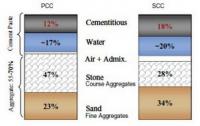
Self-compacting high-performance concrete (SCHPC) has till now suffered from one weakness — when exposed to fire it flakes and splits, which reduces the loadbearing capacity of ceilings, walls, and supporting pillars, thus increasing the risk of collapse in a burning building. Scientists have now developed a method of manufacturing fire resistant self-compacting high-performance concrete which maintains its mechanical integrity under these conditions.
-
-
Transforming deadly chemicals into harmless dirt

Destroying bulk stores of chemical warfare agents is a challenge for the U.S. and international community. Current methods of eradication, such as incineration or hydrolysis, are not fully agnostic, require significant amounts of water and create hazardous waste that requires further processing. DARPA’s Agnostic Compact Demilitarization of Chemical Agents (ACDC) program recently awarded two contracts to develop prototypes of a transportable disposal system able to convert dangerous chemicals into safe output, such as harmless soil, using minimal consumables and creating no hazardous waste.
-
-
Climate-induced disasters linked to food security across time and place
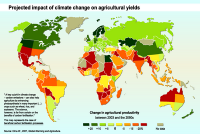
Teams of researchers in the American Southwest and North Atlantic Islands have found that historic and prehistoric peoples in these regions who had created vulnerabilities to food shortfall were especially susceptible to impacts from climate challenges. Their “natural” disasters were human made in conjunction with climate challenges.
-
-
U.K.: Economic costs from flooding could reach £1.5bn, reduce GDP growth
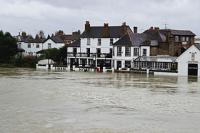
Economic losses caused by the flooding which has devastated parts of Britain in the past few days could exceed 1.5 billion pounds, and shave 0.2-0.3 percent off GDP growth overall in the first quarter of 2016. Insurers will likely shoulder the bulk of the burden after first Storm Desmond and then Storm Eva saw waters swamp large swathes of the country.
-
More headlines
The long view
New Technology is Keeping the Skies Safe
DHS S&T Baggage, Cargo, and People Screening (BCP) Program develops state-of-the-art screening solutions to help secure airspace, communities, and borders
Factories First: Winning the Drone War Before It Starts
Wars are won by factories before they are won on the battlefield,Martin C. Feldmann writes, noting that the United States lacks the manufacturing depth for the coming drone age. Rectifying this situation “will take far more than procurement tweaks,” Feldmann writes. “It demands a national-level, wartime-scale industrial mobilization.”
How Artificial General Intelligence Could Affect the Rise and Fall of Nations
By Barry Pavel et al.
Visions for potential AGI futures: A new report from RAND aims to stimulate thinking among policymakers about possible impacts of the development of artificial general intelligence (AGI) on geopolitics and the world order.
Smaller Nuclear Reactors Spark Renewed Interest in a Once-Shunned Energy Source
By David Montgomery
In the past two years, half the states have taken action to promote nuclear power, from creating nuclear task forces to integrating nuclear into long-term energy plans.
Keeping the Lights on with Nuclear Waste: Radiochemistry Transforms Nuclear Waste into Strategic Materials
By John Domol
How UNLV radiochemistry is pioneering the future of energy in the Southwest by salvaging strategic materials from nuclear dumps –and making it safe.
Model Predicts Long-Term Effects of Nuclear Waste on Underground Disposal Systems
By Zach Winn
The simulations matched results from an underground lab experiment in Switzerland, suggesting modeling could be used to validate the safety of nuclear disposal sites.
